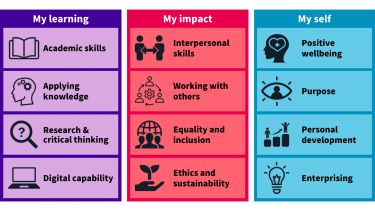The Sheffield Graduate Attributes
The University of Sheffield encourages students to develop their personal skills and characteristics as an integral part of their academic programmes in order to succeed academically and for onward career success.
Each student builds a unique profile of attributes and skills from their academic modules, work experience and other extra-curricular experiences, and students are encouraged to reflect on their strengths and consider their personal development goals using the mySkills portfolio.
Current students
Find out more about the Sheffield Graduate Attributes.
Information for University staff
Find useful resources to help you identify and communicate SGAs to students.
The twelve Sheffield Graduate Attributes (SGAs) are those skills and characteristics that the university community and external partners, including graduate employers, have agreed are likely to be particularly beneficial to academic success, personal development and future employability. They fall into three sections: My learning, My impact and My self.
Read the list of 12 Sheffield Graduate Attributes.
Students are supported by their academics and by professional services staff to review and develop their mySkills portfolio. Support for all students is available throughout the academic year from the 301 Academic Skills Centre, the Careers & Employability Service, the English Language Teaching Centre and the University Library.

